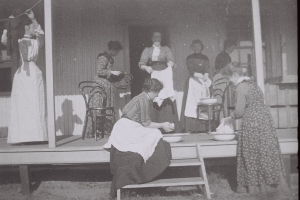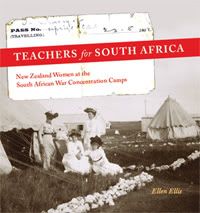
Some of the teachers 'Washing at Merebank Camp, after conference in Joburg.' Courtesy of Joy Bennett.
Where did you find this story?
In 1993 I was helping Sandra Coney with research for the women’s suffrage centenary publication Standing in the Sunshine. She found a mention of teachers who went to South Africa, and asked me to follow it up. What followed was over a dozen years of research in New Zealand, the United Kingdom and South Africa.
Why were these women sent to South Africa?
The teachers were sent at the request of the British government during the last phase of the South African War, after winning coveted teaching contracts following a recruitment campaign which attracted over 200 applicants. They were to educate the children of the ‘Boer’ enemy in the concentration camps, where up to 150,000 people – mainly women and children – were interned. These camps were the product of the British ‘scorched earth’ policy, whereby homes, stock and crops were destroyed in order to deny Boer commandos on the veld access to further supplies.
In what way did these teachers represent the ‘New Woman’ that fought for women’s right to vote in New Zealand?
They belonged to the first New Zealand-born generation of girls to be educated under a free public school system, and were among the first women professionally trained at the new teachers training colleges and the earliest women attending university courses. They were women who left their families to take sole charge of often isolated primary schools and pursue promotion through the teaching profession, and of course, they actively campaigned for parlimentary voting rights for women and cast their votes in 1893 when the suffrage was won.
Where did your research take you?
When I received my Historical Branch grant I bought a new second-hand car and set off for a tour around New Zealand to meet with descendants of the teachers, see for myself any remaining buildings associated with them, and search for any surviving records held in city and local collections. Finally, research took me to the National Archives of South Africa in Pretoria. The owners of the accommodation lodge where I stayed thought me fool-hardy when I hired a car and drove out alone as far as I could, determined to have an experience of the veld so talked about by the teachers.
Did you find yourself forming special attachments to any of the teachers?
I was on first-name terms, even family pet names, with ‘my teachers’, Nettie, Fanny, Undie, Lily, Netta, Mandy. I felt real shock and loss when I discovered in Canterbury Museum records that Nettie Guise had married and died in 1905 after only a few years in South Africa. ‘She died, she died’, I kept muttering to myself and looking around the very quiet reading room. I wanted tell, to share with someone – anyone.
